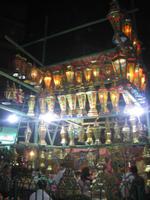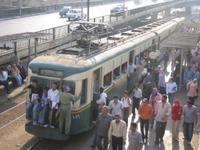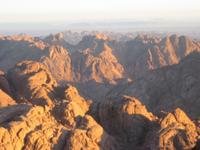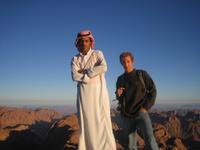Care With Love: The Overview
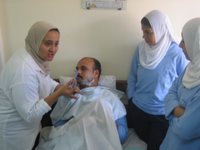 Finally the much anticipated answer to the most asked question since last April: What are you gonna do in Egypt?? Well--for the last month I've been working on a power point presentation for the NGO I work for here in Cairo, Care With Love (El-Raiyeh Bilmahaba). In two weeks the organization will be celebrating its 10th anniversary for which they would like show a presentation marking its work here in Egypt. Its the lone pragmatic task assigned to me for this month, besides teaching English to the staff, for since the end September my work facilitator, Dr. Magda Iskander, has been out of town. As she left, she said to me, "Let this be a month of orientation for you, for when I return we can better discuss your role..." So this month I've been that strange foreigner lurking about in the backs of classrooms and around hospitals, attempting to communicate about CWL, taking pictures, and asking--sometimes two and three times--the Arabic names of many an object. I realized very quickly that I was to be granted my wish for cultural immersion: Dr. Magda is the lone English speaker in the organization. So I was to form a presentation about the history, the present work, and the forecast of an organization I knew very little about from a group of people who speak a different language:> Yet, believe it or not, it has been a wonderful month of much laughter and learning as the inner workings of a wonderful organization have slowly become evident to me. So, for this entry I thought I thought you all might like to hear a little about the place I work.
Finally the much anticipated answer to the most asked question since last April: What are you gonna do in Egypt?? Well--for the last month I've been working on a power point presentation for the NGO I work for here in Cairo, Care With Love (El-Raiyeh Bilmahaba). In two weeks the organization will be celebrating its 10th anniversary for which they would like show a presentation marking its work here in Egypt. Its the lone pragmatic task assigned to me for this month, besides teaching English to the staff, for since the end September my work facilitator, Dr. Magda Iskander, has been out of town. As she left, she said to me, "Let this be a month of orientation for you, for when I return we can better discuss your role..." So this month I've been that strange foreigner lurking about in the backs of classrooms and around hospitals, attempting to communicate about CWL, taking pictures, and asking--sometimes two and three times--the Arabic names of many an object. I realized very quickly that I was to be granted my wish for cultural immersion: Dr. Magda is the lone English speaker in the organization. So I was to form a presentation about the history, the present work, and the forecast of an organization I knew very little about from a group of people who speak a different language:> Yet, believe it or not, it has been a wonderful month of much laughter and learning as the inner workings of a wonderful organization have slowly become evident to me. So, for this entry I thought I thought you all might like to hear a little about the place I work.It all started when Dr. Magda's mother took a fall. She was taken to the hospital and treated for a broken hip, and after a couple weeks it was apparent that she no longer needed the a hospital's level of care, as others could use the bed much more than she could. Instead, a program of rehab and home health care was needed given her state of mobility and general lack of ability to perform everyday tasks in the home. Having studied and lived in America, Dr. Magda was well aware of the potential for HHC systems, which were then non-existent in Egypt, and in 1996 the vision for a caretaker's training program became a reality with the launching of CWL. Though intended primarily for the service of a growing elderly population in need of HHC (as the changing economics of Egypt in the 80's and 90's meant that economically families could no longer care for their elderly as members were working multiple jobs to make ends meet), CWL also provides such benefits as the opening of a new job market for young adults in a suffering economy, turning around the lives of unemployed and marginalized young adults sought by CWL to be trained (working with churches and other NGO's, CWL specifically seeks out those individuals in drastic need of opportunity), crossing the bridges between the many groups of people here in Egypt by opening dialogue during the training sessions (CWL trains both Sudanese and Egyptians, Muslims and Christians, and men and women), and re-asserting the critical worth of nurturing care rooted in love in Egyptian society (hospitals are grossly understaffed with nurses due to a general lack of respect for the caretaker and nursing professions).
It is these very cultural attitudes toward professions of care that necessitates the program to reach deeply into the minds and hearts of trainees. Beyond the 90-day curriculum of pragmatic skills and information, Dr. Magda has introduced into the program the concept of the "decision for love." Beyond the graduation requirements of proficiency in skills and knowledge of relevant information, each trainee must profess a dedication to a career of service grounded in love for fellow humanity regardless of potential classifications of those individuals. As we are now at the training center in the later stages of the three-month curriculum, its been amazing to watch as embarrassment and even anger at the necessity of particular procedures (like catheter cleansing and bedpan placement) has been transformed to joy in service for many trainees. It is the extremely conservative character of Egyptian society that has shrouded many bodily processes not so much in secrecy, but in general taboo against the recognition of their reality. CWL is breaking down these walls, which in the future could also lead to the much needed institution of sex education and the prohibition of FGM (sadly near 98% in Egypt alone).
One the first days in Egypt here I was able to attend a graduation for a class (#39 I think, making the number of graduates now well over 500). It was a time of sincere celebration as for the first time in many of the graduates' lives, they had a real future full of hope due to the acquisition of marketable skills. The network of CWL has greatly expanded in ten years offering multiple placement opportunities, from private in-home contracting, to the governmental pediatric cancer ward (grossly understaffed and overcapacitated 'subsidized' health care environment in which CWL is supplementing staff) to the geriatric floor at the Evangelical Presbyterian Hospital. As most of the trainees come from extremely poor neighborhoods of Cairo and the generally poor areas of upper Egypt, they have often not even completed secondary school, thus extremely limiting their employment opportunities. And consequently, their joy at the essence of opportunity is really something to behold, as I contemplate the normality of not just high school but college graduation of the middle and upper classes of America. I am truly one of a comparably small numer in this world with the ability to enjoy the stability of prospective livelihood. As I watch these transformed individuals beam with great pride in their achievement, I'm reminded of how much I take for granted the ample opportunities presented to me by the numerous systems of support that hold me in my life at home--from my immediate family to my extended family to my church to my friends to my university. And in my gratitude to those who have gone before to pave a way for me (thanks mom and dad, grandparents) and to those who continually support me, I, like the caretakers from CWL, am propelled to a life of love and service, for certainly "to whom much is given, much is expected."

